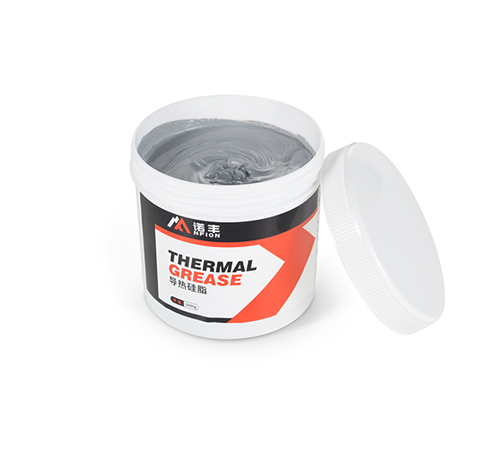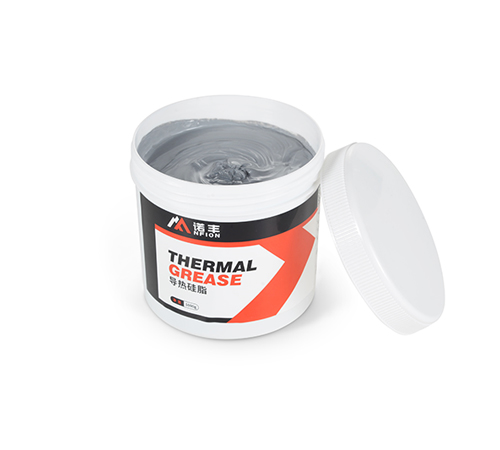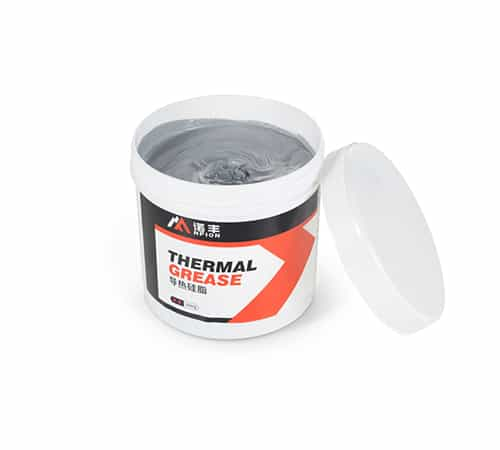
In the field of heat dissipation for electronic devices, thermal grease is a common and important material. It plays a key role in filling the tiny gaps between heat sinks and heating elements, thereby improving thermal conductivity. However, a common question about thermal grease is: does a higher density mean better performance? To delve into this issue, we need to analyze and study it from multiple perspectives.
First, let's understand the basic characteristics and functions of thermal grease. Thermal grease is mainly composed of silicone oil and thermal fillers. The silicone oil acts as a filler and wetting agent, ensuring that the grease can be evenly distributed between contact surfaces. The thermal fillers, such as aluminum oxide, zinc oxide, and boron nitride, are the key factors determining the thermal performance of the grease. These fillers have different densities, which brings us to the consideration of the relationship between density and performance.
Theoretically, a higher density might indicate better thermal performance because a higher density usually means a higher content of thermal fillers. More thermal fillers can provide more paths for heat conduction, potentially improving thermal conductivity. For example, some high-density thermal greases may exhibit better heat dissipation effects in environments with extremely high thermal requirements.
However, judging the quality of thermal grease based solely on density is incomplete and inaccurate. Here are some factors that need to be considered comprehensively:
1. Thermal Resistance: Although high density might suggest higher thermal performance, actual thermal resistance is the key indicator of heat dissipation effectiveness. Thermal resistance depends not only on the content of thermal fillers but also on the overall structure of the grease and the uniformity of filler distribution. Even if the density is high, unreasonable structure or uneven distribution of fillers can result in high thermal resistance, affecting heat dissipation.
2. Flowability and Operability: Thermal grease needs a certain level of flowability to fill the gaps between contact surfaces evenly. If the density is too high, the grease might become too thick, reducing its flowability and making it difficult to apply and handle. This not only increases the difficulty of installation and maintenance but may also lead to uneven distribution of the grease, affecting heat dissipation.
3. Compatibility: Different electronic devices and components may have varying requirements for the performance and compatibility of thermal grease. Some high-density greases might be incompatible with certain materials or surfaces, causing corrosion, aging, and other issues. When choosing thermal grease, it is crucial to consider the specific conditions and requirements of the equipment, rather than just the density.
4. Cost: Generally, high-density thermal greases tend to be more expensive. In practical applications, it is necessary to balance performance improvement with cost increase. For situations where heat dissipation requirements are not extremely stringent, choosing a more cost-effective grease may be more appropriate.
To better illustrate the impact of these factors, let's consider some practical examples. Suppose there are two types of thermal grease, A and B, with densities of 2.5 and 3.0, respectively. Based on density alone, B seems to have an advantage. However, further testing and analysis might reveal the following situations:
- Grease A, despite its lower density, has very low thermal resistance and provides excellent heat dissipation in practical applications. Additionally, it has good flowability, is easy to apply and handle, is well-compatible with most devices and components, and is relatively low-cost.
- Grease B, although denser, has high thermal resistance due to structural or filler distribution issues. Furthermore, its excessive thickness and poor flowability can lead to bubbles or uneven distribution during installation, affecting heat dissipation. Moreover, its higher cost may increase the overall expense.
In this scenario, choosing grease B based solely on density would be inappropriate. Instead, considering all factors comprehensively, grease A might be the better choice.
So, how should we choose the appropriate thermal grease in practical applications? Here are some suggestions:
1.Identify the Thermal Requirements of the Equipment: Different electronic devices and application scenarios have varying heat dissipation requirements. Before selecting thermal grease, detailed analysis of the device's power dissipation and operating environment is necessary to determine the required thermal performance.
2.Consider Multiple Performance Indicators: Besides density, attention should be paid to thermal resistance, flowability, compatibility, stability, and other performance indicators. By comprehensively evaluating these indicators, the most suitable grease for the equipment can be chosen.
3.Conduct Actual Tests: If conditions permit, it is best to conduct actual tests and comparisons of different thermal greases. Measuring parameters such as temperature and thermal resistance can provide a direct understanding of the performance of various greases.
4.Refer to Manufacturer Recommendations: Equipment manufacturers usually provide recommendations or requirements for suitable thermal greases. Following the manufacturer's recommendations ensures compatibility and performance of the grease with the equipment.
5.Consider Cost Factors: While meeting performance requirements, it is important to choose a reasonably priced thermal grease. Avoid excessive pursuit of high performance that leads to significant cost increases.
In conclusion, the density of thermal grease is not the only standard for judging its performance. When selecting thermal grease, it is necessary to comprehensively consider factors such as thermal resistance, flowability, compatibility, and cost, and to choose based on the specific conditions and requirements of the equipment. Only in this way can we ensure the selection of the most suitable thermal grease, achieve good heat dissipation, and ensure the stable operation of electronic devices.
Additionally, with continuous technological development and progress, new types of thermal greases are constantly emerging. These new greases may have unique advantages in terms of performance, environmental friendliness, and reliability. Therefore, we need to keep abreast of the latest developments in the field of thermal grease, continuously update and optimize our selection criteria.
In the future, we can expect thermal grease technology to develop towards higher performance, lower cost, and greater environmental friendliness. For example, by developing new types of thermal fillers or improving grease formulations, it is possible to enhance thermal performance while reducing costs; developing more environmentally friendly greases to reduce environmental pollution; or combining other heat dissipation technologies, such as heat pipes and heat sinks, to achieve more efficient heat dissipation solutions.
In summary, a higher density does not necessarily mean better thermal grease. When selecting thermal grease, it is important to comprehensively consider and evaluate multiple factors to ensure the selection of the most suitable product. Only in this way can we achieve good heat dissipation while balancing cost, operability, and equipment compatibility, ensuring reliable support for the stable operation of electronic devices.

 CN >
CN >



